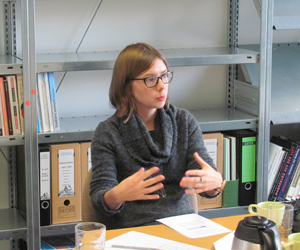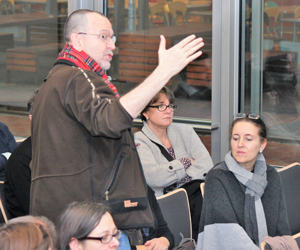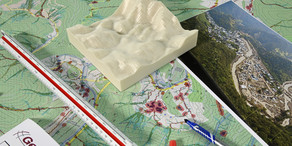Benjamin Davy
Seele and Dieterich qualified for the professorship "surveying and land readjustment" by their experience in the practice of land readjustment and land value assessment (municipal surveying) as well as by their memberships in expert committees for valuation and reallocation committees. In the (second) advertisement for the university professorship C4 for land policy, land management and municipal surveying (DIE ZEIT, February 14, 1997), the faculty emphasized that "municipal surveying can also be covered by staff." Scientific theories of land policy now move into the foreground of the central topics: fundamental questions of land constitution, the functioning of the land market or the interactions between spatial development, spatial planning, the land market and the approaches of land management in the economical use of land. Although "practical experience" is described as "desired" in the call for applications, the emphasis is now on a theoretical orientation. After the first round of the appointment process ended unsuccessfully due to ministerial directive, the second round resulted in the appointment of an applicant who could neither demonstrate practical experience with municipal surveying nor special knowledge of the German planning system. Since the successful applicant is the first author of this chair history, I tell about the years 1997 to 2018 from my perspective and not in the third person.
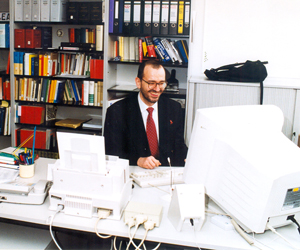
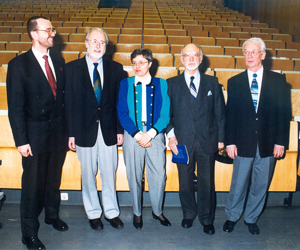
My name is Benjamin Davy. I was born in Vienna in 1956. From 1974 I studied at the Faculty of Law of the University of Vienna and graduated as "Doctor iuris" in 1980. Until my appointment at the University of Dortmund, I worked at the Institute of Law at the Department of Spatial Planning and Architecture (later: Architecture and Spatial Planning) of the Vienna University of Technology, first as a university assistant, later as an assistant professor and associate university professor. After successfully completing my habilitation at the University of Vienna, I was awarded the teaching license as a university lecturer in constitutional and administrative law in 1991. In my habilitation thesis "Gefahrenabwehr im Anlagenrecht" (Davy 1990) I examined the administrative police tasks and instruments for ensuring the safety of industrial plants. My interest in spatial planning was aroused in conversations with colleagues who were interested in the economic consequences of the (then) new Austrian tenancy law. I deepened this interest with a study of site planning for waste management facilities, which I conducted as a Joseph Schumpeter Fellow at the "John F. Kennedy School of Government" and the "Harvard Law School" during the academic year 1994/95. In "Essential injustice" (Davy 1997), the focus is on the ways in which land use planning and environmental policy can deal with unavoidable injustice. This study is my first scholarly engagement with spatial planning as a science and includes a discourse-analytic case study of a waste-to-energy facility in East Liverpool, Ohio. Also evident here for the first time is my theory of polyrationality (based on Mary Douglas and Mike Thompson).
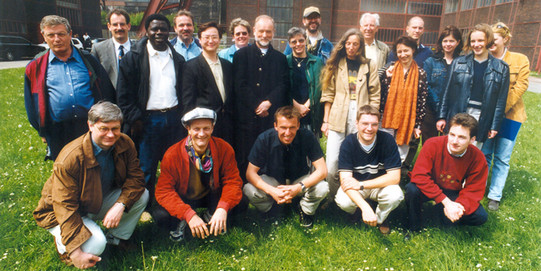
Initially, I was a chair representative in 1997 and, due to my appointment in 1998 (thus in the year of the department's 50th anniversary), I have been a university professor for land policy, land management and municipal surveying at the Department of Spatial Planning of the TU Dortmund University for 20 years, for some years now self-proclaimed "TU Dortmund University"1. In 2000/01 I held the office of Dean of the Department of Spatial Planning, and in 2002-2005 I was a member of the Academic Senate of the TU Dortmund University.
The first years in Dortmund I learned a new subject in addition to my habilitation subject in order to gain as much as possible of the knowledge that my two predecessors had acquired in practice. I spent many days and nights studying Dieterich's "Baulandumlegung" and Kleiber's valuation manuals. I considered myself extremely privileged because my co-workers (many of them in picture 20) supported me to the best of their ability in my studies.
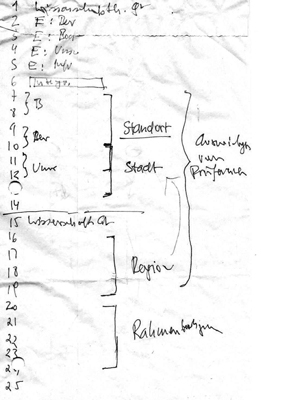
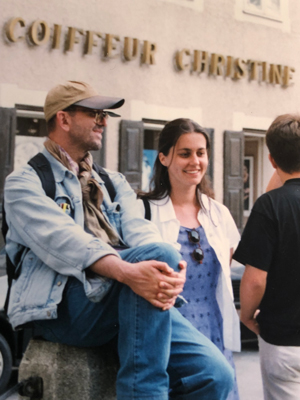
I also received almost magical support from the joint compact event "Theories and Models of Spatial Development". Volker Kreibich and Gerd Held (GEO), Ekhart Hahn and Heike Köckler (VPU), and Dirk Bracke and I (BBV) argued together about the theory of central places, the economic and political implications of the garden city idea, the comparison between European coalfields (from Newcastle upon Tyne to the Ruhr and Upper Silesia to the Donets Basin), and the topicality of Thuenen's land rent theory. Joint teaching not only wants to be well planned, but is also instructive. In the joint T+M seminar, I not only learned all about basic existence functions, ecological footprints, and barrel kilometric minimum points. Rather, I began to appreciate the special quality of Dortmund's spatial planning: content and methodological syncretism at a high level (often referred to as "interdisciplinarity") and in the form of a disputation, a friendly argument. Important elements of our joint T+M seminars were excursions lasting several days, for example to Salzburg. As a result of these experiences, the Chair of BBV has done somewhat less for geodesy in the past 20 years than was the case under Seele and Dieterich. On the other hand, the interest in crossing disciplinary boundaries and cross-sections as well as in spatial planning as a science came to the fore. And there was also a lot of arguing at/with BBV!
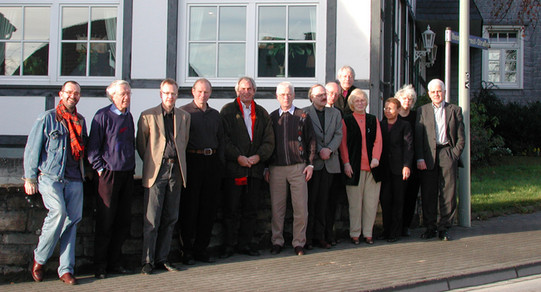
Similar to Walter Seele, the deanship affected me soon after my appointment, namely in the years 2000/01. Although the experiences with the deanship are instructive for all professors, the larger and smaller conflicts consume a lot of energy, which is then neither available for one's own chair nor for research and teaching. The asbestos removal of the storey buildings I and III, the reduction of temporary mid-level positions and the introduction of "pool positions", the negotiations with the rectorate about a "quality pact", the internal conflicts about the appointment procedures VES, STB and SRP, the increasingly overly formalized teaching obligations or the mourning work after the attacks on September 11, 2001 are among the experiences I would rather not have had. However, the dean's office also brought nice moments, such as the encounters of colleagues outside the formalized discussion rounds. Certainly, an improved climate of conversation could not prevent agnostic behavior. Nevertheless, I like to remember the "rules of conduct" that colleagues Paul Velsinger and Heinrich Schoof gave to professors as instructions for collegial interaction in everyday life. Although derided by some as "rules of cognac", this initiative ensured pleasing collegial cohesion - at least for some time.
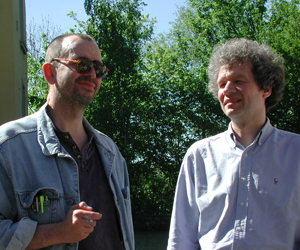
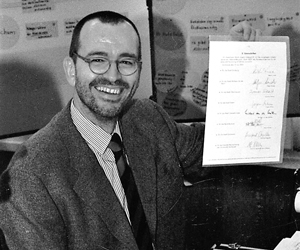
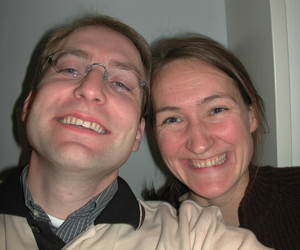
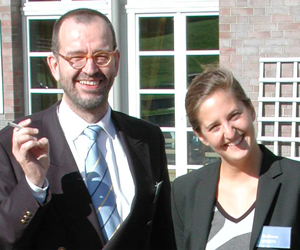
As dean, I wanted not only to administer, but also to connect the faculty with the region through joint research. The offer from Dr. Wolfgang Roters (then MSWKS) provided an enticing template. In a presentation at the invitation of the Mittelbau, Roters promised to support the faculty in becoming more involved in the Ruhr region. The result was the collaborative project "Urban Region Ruhr 2030," funded by the German Federal Ministry of Education and Research (BMBF) and the North Rhine-Westphalian Ministry of Urban Development and Housing, Culture and Sports (MSWKS). The partners for the collaborative research were the Department of Spatial Planning and the independent cities of Duisburg, Oberhausen, Mülheim an der Ruhr, Gelsenkirchen, Essen, Herne, Bochum and Dortmund. According to the final accounts for the years 2001 to 2003, the partners of "Städteregion Ruhr 2030" received third-party funding of about € 1.37 million from the BMBF alone (including the MSWKS share: about € 1.7 million). In joint seminars, BBV and the Dortmund American Studies Department looked for theoretical foundations ("border studies") for cross-border cooperation. Axel Kolfenbach (today: Bundesanstalt für Immobilienaufgaben) and Dr.-Ing. Stefanie Bremer (co-founder of the planning office orange edge and since 2016 university professor for integrated transport planning at the University of Kassel) supported the redefinition of a "regional land order". Accordingly, the relief was great when all partners signed the project description.
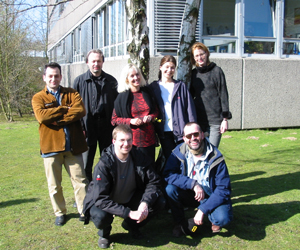
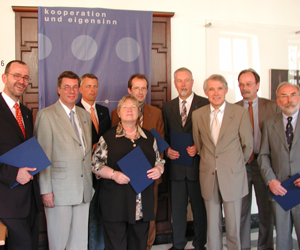
"Städteregion Ruhr 2030" developed a mission statement for city-regional cooperation according to the motto "cooperation and stubbornness". In testing their cooperation, the cities were supported by the "tower of visions," a group of scientists at IRPUD. On June 6, 2003, the cities entered into a city-regional contract. In this contract, it was agreed to continue the Ruhr city region as a regional policy practice and to implement it through cooperative guiding projects. The guiding principles of the Ruhr city region summarize results of the research network in core statements:
- Rule-governed project network: the Ruhr city region is a rule-governed project network of the cities of Duisburg, Mülheim an der Ruhr, Oberhausen, Essen, Gelsenkirchen, Herne, Bochum and Dortmund.
- Cooperation and stubbornness: Cooperation between the cities in the Ruhr region makes sense if it is useful for each individual city. The stubbornness of the cities is a treasure trove for the future of the Ruhr city region.
- The Ninth City: The Ruhr City Region challenges to explore and develop its spaces of possibility. Possibility management, i.e. the flexible handling of boundaries, breaks down unnecessary barriers and opens up spaces of possibility.
- Competition of ideals: In the Ruhr city region, stubbornness inspires the search for the best solutions to common tasks.
- Culture of difference: In the Ruhr city region, differences are not merely tolerated, but utilized through the flexible handling of boundaries.
- Agreed cooperation: For each lead project of the Ruhr city region, suitable rules of the game are agreed upon, which are based on common experiences of cooperation.
- Responsive cooperation: Simple rules open up a space of possibility for cooperation and obstinacy. Mutual understanding is the basis for joint action between the cities.
- Cooperation as a process: Successful lead projects of the Ruhr city region offer opportunities to find creative and advantageous solutions together with other actors and without renouncing own interests.
I described my experiences in the collaborative project in "The Ninth City. Wild Borders in the Ruhr Urban Region 2030" (Davy 2004) and in "Plan It Without A Condom!" (in German: "Raumplanung ohne Präservativ") (Davy 2007 and 2008). Social contract theories and Mary Douglas' "cultural theory" played a central role. Davy (2004) contains the first version of my theory of polyrationality.
The encounters with wild borders in the Ruhr urban region had a lasting impact on the theory. Land readjustment, after all, consists to a considerable extent of a flexible handling of the boundaries of what is called "throw-in" land. The flexible handling of boundaries is, of course, also an essential characteristic of urban land use planning, which is deliberately freed by the legislator from the strict obligation to existing property boundaries (§ 200 para. 1 BauGB). And finally, land readjustment must not only deal with property boundaries, but also with political, economic, cultural, social and ecological boundaries. Seminars on negotiated solutions built on the Harvard concept of negotiation, using playful enactments of the prisoner's dilemma or negotiation simulations to make clear the advantages of alternative conflict resolution. But discussions are also at the forefront of the major lectures on land readjustment and land value assessment. For example, on the significance of Foucault for land policy.
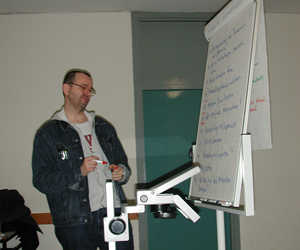
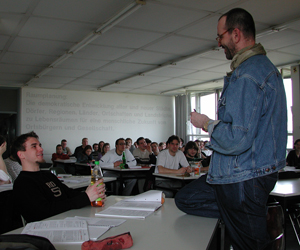
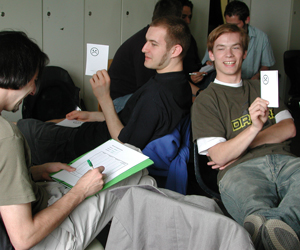
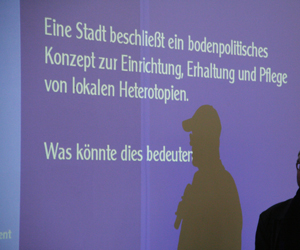
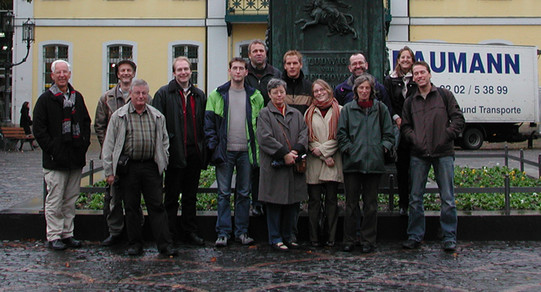
In 2004, Hartwig Junius took his leave from active service. His lectures and exercises for surveying (a service for the Faculty of Civil Engineering), which he had held for many years, were cancelled. For the continuation of the lecture and exercise "Planning Cartography", the chair was assigned a half-time mid-level position for three years. For this task, Diplomgeographin Gabi Zimmermann, graduate of the TU Dresden, was hired, who was supported in teaching by Heinz Kobs.
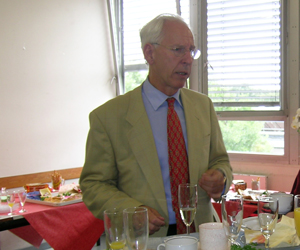
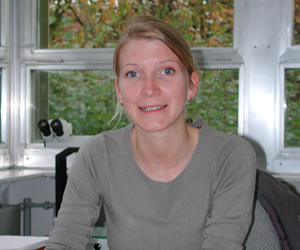
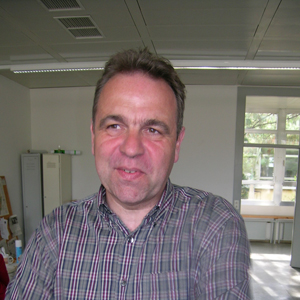
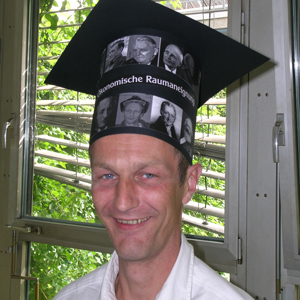
In 2004, Dr. rer. pol. Dirk Bracke received his doctorate with his thesis "Verfügungsrechte und Raumnutzung. Land Rent and Externalities as Economic Concepts and Explanatory Model of Spatial Development." Bracke (2004) marks a turning point in doctoral research. Whereas earlier VBO doctoral dissertations were always devoted to practice-related topics, Bracke examined property-theoretical issues. In 2018, Dirk Bracke and his son Alexander were killed in a car accident.
Problems of value assessment in areas in particular need of renewal formed the basis of a negotiation simulation, which did not lead to any third-party funding, but did result in illustrative teaching aids. Prior to this, the simulation was extensively tested at the chair. For teaching in the field of land valuation, membership in several expert committees for land values proved helpful (since 2005 in the city of Hagen, since 2008 in the city of Dortmund and in the Higher Expert Committee for Land Values in the state of North Rhine-Westphalia). A count of pedestrian frequency in downtown Hagen by participants in the lecture "Planning Cartography" and a survey of store rents by the office formed the basis for a thematic map. This map illustrated the spatial distribution of pedestrian frequency and store rents and showed: Differently strong pedestrian frequency and differently high rents for store premises largely coincide ("A lot going on, a lot of moss!").
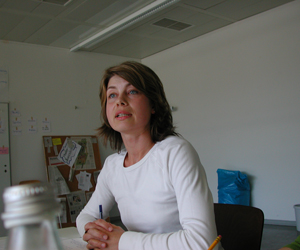
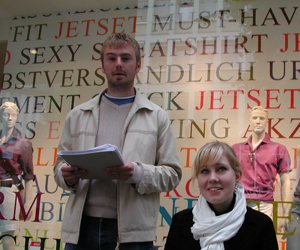
A research contract that shaped the Chair BBV was awarded by the International Building Exhibition Saxony-Anhalt 2010. Using the city of Magdeburg as an example, the task was to investigate what scope exists in terms of urban development planning and land policy in an "empty city". As the former capital of heavy industry in the GDR, the city of Magdeburg, whose mayor Otto von Guericke became famous for his physical experiments and the discovery of the vacuum, is confronted with all the problems of structural change from which the Ruhr urban region also suffers. Therefore, this city is particularly suitable for an investigation of the effectiveness of property arrangements shaped by § 903 BGB and Article 14 GG. How do the instruments of the BauGB - land use and urban land use planning, plan protection, planning damage law, building land reallocation, expropriation, development - work under the conditions of an "empty city" (Davy 2006 and 2007). As a counterpoint to the planning system of the BauGB, which is designed for economic and settlement growth, the Magdeburg study provides a wealth of evidence on which ownership arrangements offer promising alternatives to the predominantly liberal concept of land ownership when settlement pressures are dwindling and populations are shrinking ("shrinkage").
Between 2005 and 2008, the staff changed several times. First, Tana Petzinger and Kamilla Kanafa, who had moved from IRPUD to BBV after their engagement for "Städteregion Ruhr 2030", said goodbye together with Gabi Zimmermann and Axel Kolfenbach. Thomas Hartmann enriched BBV with a hitherto little studied topic: soil policy and flood protection together with his later wife Gabi, née Zimmermann.
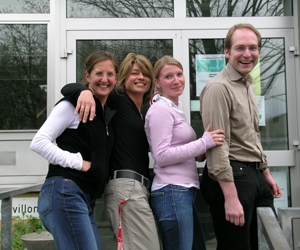
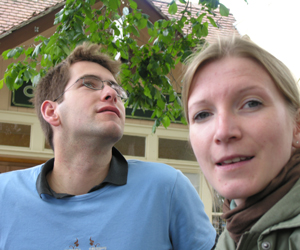
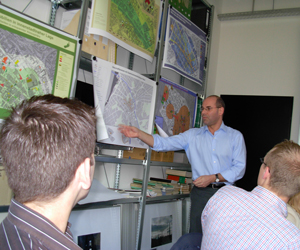
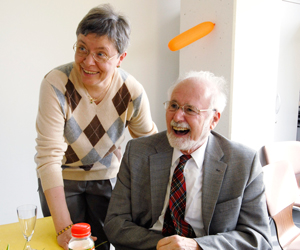
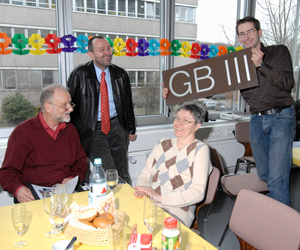
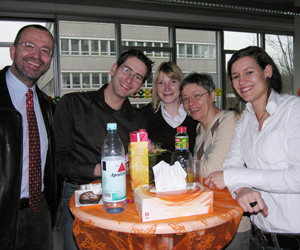
The lawyer and geographer Dr. Fabian Thiel supported - although only for a short time - the research in the field of spatial common property and "common property" (today private lecturer at the University of Giessen and professor at the Frankfurt University of Applied Sciences). In 2007, a surveying assessor, Kathrina Schmidt, was again recruited for BBV. And in 2008, Brigitte Hower retired.
BBV was fortunate in its misfortune. Ms Susanne Syska-Fleckes succeeded Brigitte Hower as office coordinator. Initially, she worked for Professor Kroes until 2005 and for the chair of SYS until the retirement of university professor Dr. Dr. Walburga Rödding.
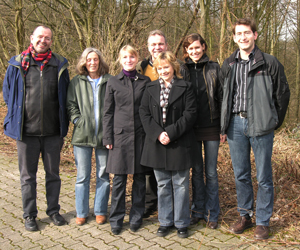
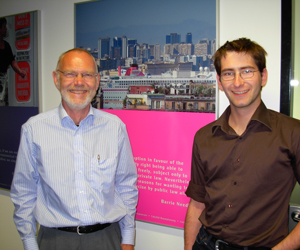

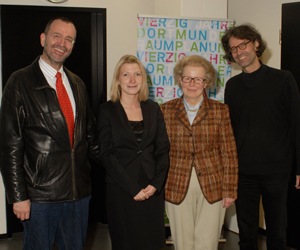
The following years were characterized by successful doctoral research. Dr. rer. pol. Thomas Hartmann wrote his doctoral thesis on the relationship between spatial planning and flood management (Hartmann 2009, 2010, 2011), with his research building on the theory of polyrationality. In 2018, Hartmann was appointed "Associate Professor" at the Land Use Planning Group at Wageningen University (The Netherlands). Dr.-Ing. Gabi Zimmermann received her PhD with a thesis on automated image interpretation. Surveyor Dr.-Ing. Kathrina Völkner, née Schmidt, received her doctorate for her dissertation on value determination in relation to traffic value and the effects of the Federal Constitutional Court's case law on inheritance and gift tax on value determination in urban development and valuation under tax law. Dr.-Ing. Völkner has headed the department of land readjustment and valuation of the Surveying and Cadastral Office of the City of Düsseldorf since 2018.
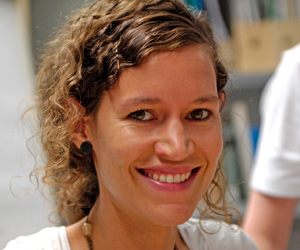

From 2007 onwards, the cooperation with University Professor Dr. jur. Ulrike Davy (Faculty of Law, Bielefeld University) and University Professor Lutz Leisering, PhD (Faculty of Sociology, Bielefeld University) resulted in a reorientation of the chair's research.
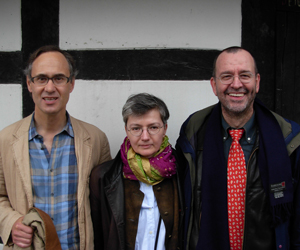
Increasingly, land policy and the right to land use in the global South came into focus as an instrument of social security. The research network FLOOR "Financial Assistance, Land Policy, and Global Social Rights" included the DFG-funded project "Socio-ecological land policy", which had been successfully acquired by the Chair BBV.
Find one of the working papers from FLOOR by Michael Kolocek on "Land policy and the social floor to housing - The Case of Latin America and Africa" here.
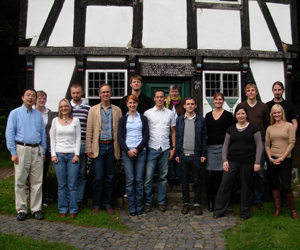
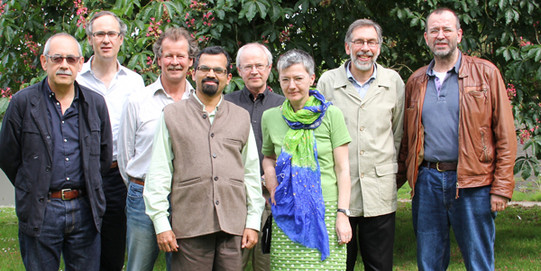
The first results of FLOOR were a cooperation group at the Center for Interdisciplinary Research (ZiF) in Bielefeld, the publication of the textbook "Land policy", a special issue on "social citizenship" (Davy et al. 2013).
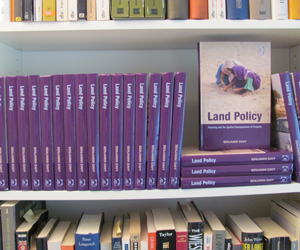
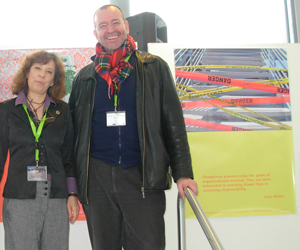
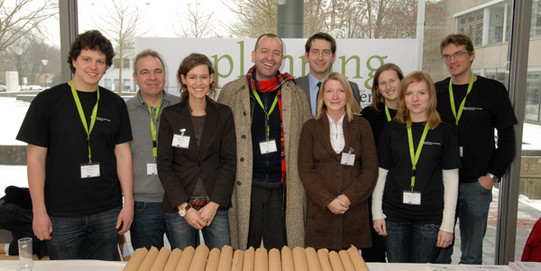
AESOP, the "Association of European Schools of Planning", played an important role in the internationalization of Dortmund's soil policy. The exchange with colleagues from European, but also North American planning schools continued an internationalization that had already been started by Seele and Dieterich.
AESOP was founded in 1987, partly on the initiative of Klaus Kunzmann, at Cappenberg Castle near Dortmund. Another co-founder, Patsy Healey, encouraged Rachelle Alterman, Willem Salet, and me to form a planning law theme group. From this theme group, the International Academic Association on Planning, Law, and Property Rights (PLPR) was born. In 2010, the annual conference of PLPR was held in Dortmund at the invitation of the Chair of BBV. In 2012, I had the privilege to contribute to the 25th anniversary with a keynote speech on "Do planners have heroes?".
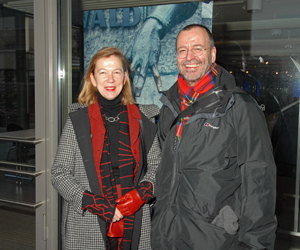
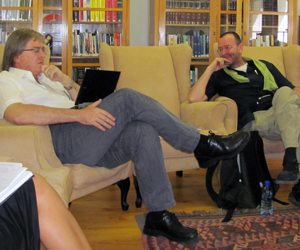
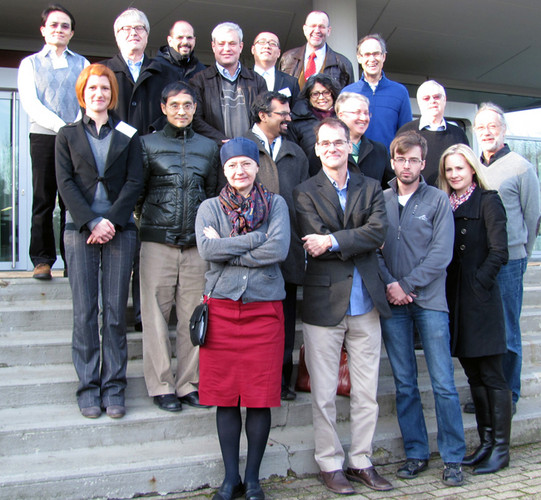
On a research trip to South Africa, I met Professor André van der Walt, whose property law writings had deeply impressed me for some time. Van der Walt (1956-2016) was still attending the first of three preparatory conferences for a ZiF research group dedicated to "Understanding Southern Welfare". The object of study for the proposed research group was the interplay between land reforms, social policy, and constitutional development in four countries: Brazil, South Africa, India, and the People's Republic of China.
In 2012, I was elected president of the PLPR; Thomas Hartmann was elected secretary general.
Notwithstanding many research trips - for example to Bangladesh, India, Israel, South Africa, the United Kingdom, the United States - the connection to the Ruhr city region was not neglected. The cities, which were once joint partners of the Department of Spatial Planning, continued the stubborn cooperation, added new partners and developed concrete projects, such as a city-regional observation of the housing market. Important elements of the cooperation in "Städteregion Ruhr 2030" - such as regular meetings of the planning directors - were continued. In 2013, on the 10th anniversary of the City-Regional Contract, a series of lectures and a celebration were held at the department (as part of the Urban Planning Colloquium) and at Zeche Zollverein, always emphasizing the important role of the Department of Spatial Planning as a source of inspiration for the Ruhr City-Region.
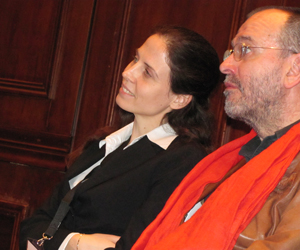
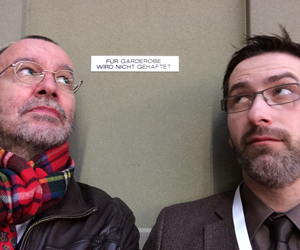
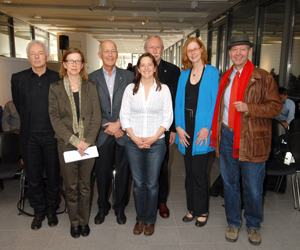
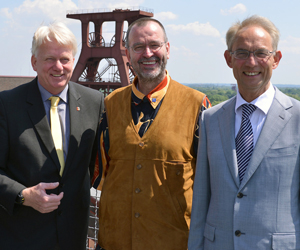
The internationalization of teaching in land policy and land management has repeatedly met with opposition. In 2011, about 80 students protested an exam question with a letter addressed to the examination board. This question contained an English-language text by Nobel Prize winner Elinor Ostrom on avoiding the tragedy of the commons. Although this text had been discussed at length in the lecture and translated, the students did not want to accept that spatial planners worldwide communicate predominantly in English, not in German. Colleague Grigoleit and I decided to invest our prizes awarded by the students for our teaching efforts in an Elinor Ostrom kicker. The BBV team lost miserably in the tournament that was immediately organized. Far more open to international trends was novice project A01 (2014/15), which examined the spatial contextualization of all selfies tagged with #Ruhr (or similar hashtags). This study project was reported nationwide, including in the "Tagesschau".
In 2015, University Professor Dr.-Ing. Walter Seele, the first Chair of Land Use Planning and Surveying at the Department of Spatial Planning at the TU Dortmund University, passed away. In a dedicated speech on his 90th birthday, Seele opposed the overuse of the word "management" and emphatically emphasized that "soil management" or "land management" could never reach the level of genuine "land planning".
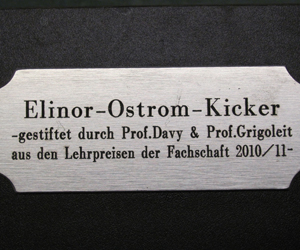
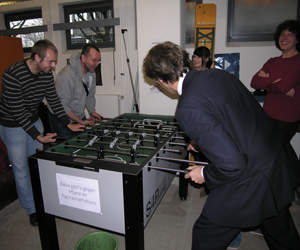
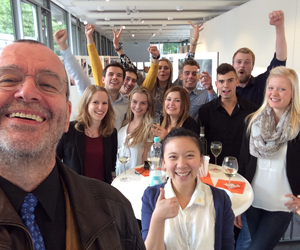
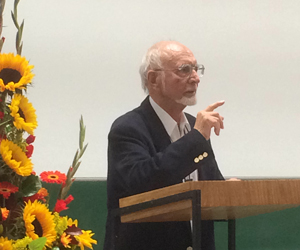
Michael Kolocek, who initially worked in the FLOOR project at BBV from 2010, succeeded his BBV predecessor, Thomas Hartmann, as PLPR Secretary General from 2014 to 2016. He completed his disputation in 2015 and received his doctorate (Dr. rer. pol.) with his most important FLOOR contribution, the book "Land policy and the human right to housing" (Kolocek 2017), for which he was awarded the dissertation prize of the TU Dortmund University in the field of spatial planning and the DMB Study Prize Housing Policy 2017. Michael Kolocek deepened his doctoral studies especially in the fields of discourse analysis, housing, and human rights (Kolocek 2013, 2014, 2015, 2018). In 2015, Heinz Kobs celebrated his 40th anniversary of service (71, together with Susanne Syska-Fleckes). Old and new mid-level employees joined in the celebration.
In the fall of 2015, the first West Asian PLPR regional conference was held at the "Indian National Law School" in Bengaluru (India) as a conclusion of the DFG-funded project "Socio-ecological land policy". Several papers from this conference were published by Springer Nature (Pellissery et al. 2017).
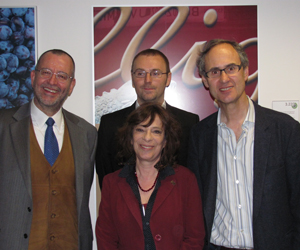
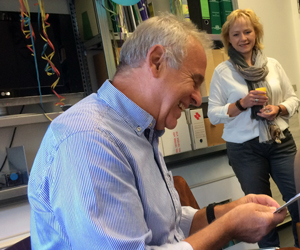
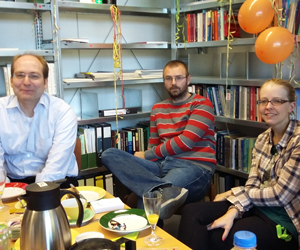
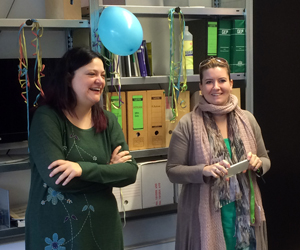
In 2016, my term as President of the PLPR ended at the conference in Bern. In 2017, Susanne Syska celebrated her 25th anniversary of service. The chair was represented by four presenters at the PLPR conference in Hong Kong (2017) . After Vienna (2005), Manchester (2009), Belfast (2013), and Stare Lesna (2015), this was the fifth time I was one of the mentors in the AESOP PhD seminar in Aveiro. Participants came from planning schools, mostly from Europe, and learned from each other how to expect the unexpected. At the subsequent AESOP Annual Congress in Lisbon, I was elected as the next president of AESOP. As a university professor in Dortmund, I attached great importance to "academic citizenship". This includes participation in the PhD workshop of AESOP and PLPR as well as participation in peer review and editorships of international journals. I contribute as an editor to "Planning Theory and Practice" (Editorial Board), "Planning Theory" (Essay Editor), "Journal of the American Planning Association" (Editorial Board), and "Town Planning Review" (Co-editor).
Since 2017, BBV has been involved in the collaborative research project "Zukunft Stadt Region (ZUKUR)", which the Department of Spatial Planning is conducting together with the Regionalverband Ruhr, the City of Bottrop and the City of Dortmund ("nordwärts"). Through a full-day negotiation simulation, the chair offered the project partners the opportunity for an in-depth discussion of climate resilience and climate justice . In addition, BBV explores the role of spatial commons in climate action. Using the example of the RS1 - a 100 km long bicycle expressway that runs across the Ruhr city region - symbolic politics in climate protection, climate-friendly mobility and food justice are examined.
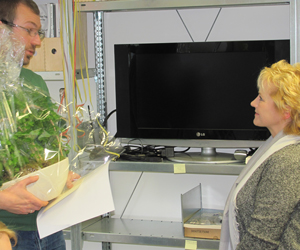
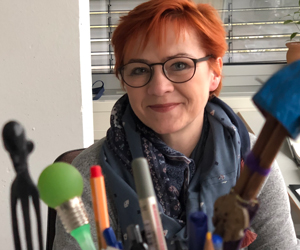
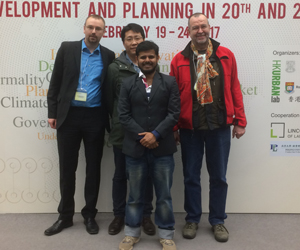
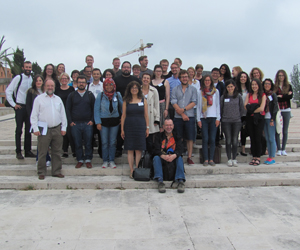
In the 50 years of its existence, the employees of the chair "Surveying and Land Use Planning" / "Land Policy, Land Management, Municipal Surveying" experienced a rapid technical change. Many of the innovations in data processing in municipal surveying have completely changed the possibilities in research and teaching as well as the jobs especially for technical employees. Fifty years ago, the position of knowledge and experience from practice was valued much higher. Today, the chair places greater emphasis on international research and conference participation, publications in English, and theory building. This emphasis is tolerated but hardly supported by the university and the faculty. Presumably this was not different 50 years ago - a Dortmund interpretation of the "freedom of science" as already reported to me by colleagues Seele and Dieterich. In teaching, the diversity of the thematic offer has noticeably decreased due to the reduction in the number of academic staff, the modularization of teaching units and the bureaucratic handling of teaching obligations (just compare the range of courses offered 50, 25 or 5 years ago)2. For the practice of teaching, this meant that some just had to do it more than once - as in the collage of a BBV logo created in 2008.
The biggest change in land policy is probably that corporations enjoy the same protection as private individuals for their large-scale investments in land ownership (Davy 2016). This was not always so clear, as late as 1967 the Federal Constitutional Court recognized:
"Land cannot be readily equated with other assets, either in economic terms or in terms of its social significance; it cannot be treated as a mobile commodity in legal transactions." (BVerfGE 21, 73[82-83] - Land Transactions).
With the establishment of German unity, the use of land as an investment object became an indisputable matter of course - the German version of the "myth of land". For spatial planning, this has made it increasingly difficult to establish a socially just use of land (§ 1 para. 5 BauGB) or a land economy that conforms to "the principles of justice" and the "guarantee of an existence worthy of human beings" (Article 151 Weimar Imperial Constitution). Therein lies a challenge that will continue to occupy the Chair in the coming 50 years.
